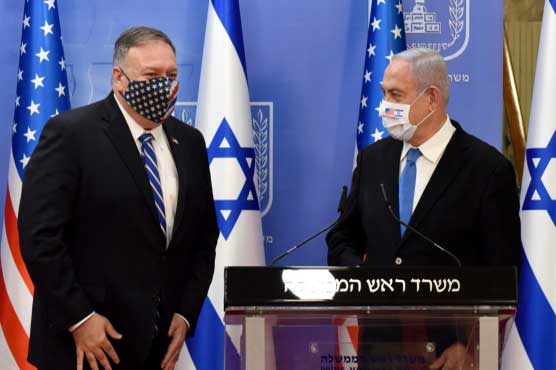Pompeo, Netanyahu hopeful more Arab states will forge Israel ties

US and its close ally hope Israel will be able to normalise ties with other regional countries.
JERUSALEM (AFP) - Israel s prime minister and the US top diplomat voiced hope Monday the Jewish state would soon build ties with more Arab countries, following its landmark normalisation of relations with the United Arab Emirates.
Israel s Benjamin Netanyahu and US Secretary of State Mike Pompeo, who started a Mideast tour in Jerusalem, both praised the US-brokered deal as a milestone toward bringing stability to the turbulent region.
"I m very hopeful that we will see other Arab nations join in this," said Pompeo, who was also set to visit Sudan, Bahrain and the UAE on a five-day regional tour.
Netanyahu hailed the Israel-UAE agreement as "a boon to peace and regional stability" which "heralds a new era where we could have other nations join".
"I hope we ll have good news in the future, maybe in the near future," he said.
Netanyahu called Israel s agreement with the Emirates, the first of its kind in a quarter century with an Arab state, an "alliance of the moderates against the radicals".
Washington and its close ally hope Israel will be able to normalise ties with other regional countries traditionally hostile to it, in part to forge a stronger regional alliance against their common arch foe Iran.
Pompeo again stressed US President Donald Trump s goal that "Iran will never have a nuclear weapon" and urged the international community to maintain an arms embargo on the Islamic republic.
Legacy of hostility
Israel had previously only signed peace treaties with Egypt and Jordan, which unlike the UAE share borders with Israel and had technically been at war with the Jewish state.
The pro-Netanyahu daily Israel Hayom said Sunday that direct talks with the UAE on the wording of the deal were close to starting and that "a full agreement could be reached within a month".
Under the US-brokered agreement announced on August 13, Israel pledged to suspend its previous plans to annex parts of the occupied West Bank, without saying for how long.
The Palestinians have slammed the UAE s move as a "stab in the back" while their own conflict with the Jewish state remains unresolved.
The Islamist group Hamas, which rules the Gaza Strip, Monday charged that the Israel-UAE deal helps "maintain crimes and violations" against the Palestinians.
It urged regional and world leaders to "break their silence to bring an end" to the Gaza blockade.
In the latest upsurge of violence, Israel has bombed the coastal strip almost daily since August 6, while balloons carrying fire bombs and, less frequently, rocket fire have hit Israel from Gaza.
Bahrain, Oman, Sudan?
The Israel-Emirati pact has sparked speculation on which regional country might be next, with frequent mentions made of Bahrain and Sudan.
Israel remains technically at war with Sudan, which for years had supported hardline Islamist forces but which is turning its back on the era of strongman Omar al-Bashir who was ousted last year.
The State Department said Pompeo would meet Sudanese Prime Minister Abdalla Hamdok during his tour, to "express support for deepening the Sudan-Israel relationship".
Pompeo will also meet Bahrain s Crown Prince Salman bin Hamad Al-Khalifa before talks with UAE foreign minister Abdullah bin Zayed Al-Nahyan, it said.
Saudi Arabia, in keeping with decades of policy by the majority of Arab states, has said it will not follow the UAE s example until Israel has signed a peace deal with the Palestinians.
Israel and the UAE say they want to promote trade, especially the sale of Emirati oil to Israel and Israeli technology to the UAE, establish direct air links and boost tourism.
Netanyahu has denied reports that the UAE deal hinges on the sale of US F-35 stealth fighter-jets to the Emirates, saying he opposes a move that could reduce Israel s strategic edge in the region.
"This deal did not include Israel s acceptance of any arms deal," he said Monday.
Pompeo said the US was determined to help UAE defend itself against Iran and would do it "in a way that preserves our commitments to Israel".
"The United States has a legal requirement with respect to (Israel s) qualitative military edge. We will continue to honour that," he said.
"But we have a 20-plus year security relationship with the United Arab Emirates as well, where we have provided them with technical assistance and military assistance."
Washington, Pompeo said, would "continue to review that process to continue to make sure that we re delivering them the equipment that they need to secure and defend their own people."

